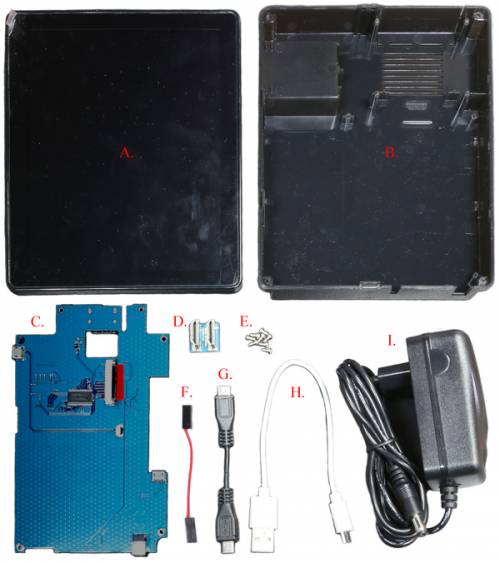Table of Contents
ODROID-VU8C
8inch multi-touch screen for ODROID-C2 and C1+
It gives users the ability to create all-in-one, integrated projects such as tablets, game consoles, infotainment systems and embedded systems.
Assembly guide by ETA PRIME !
Specifications
- 8-inch TFT-LCD
- Resolution: 1024×768 pixels (4:3 ratio)
- finger capacitive touch input (USB ID 18D1:4E12)
- light brightness control with ODROID GPIO PWM
- consumption : 700mA/5Volt (Only LCD and display controller)
- angle : Left 75, Right 75, Up 75, Down 75 degree
- Dimensions : 189 x 149 x 29 mm
- Viewable screen size : 162 x121.5 mm (active area)\
Package include
A. Assembled 8inch TFT LCD + 10 points multi touch screen
B. Plastic bottom case
C. Converter board
D. HDMI dual gender board
E. 8 x 3.5mm screws
F. 2port jumper cable
G. Micro-to-Micro USB Cable (approx. 8cm)
H. Micro-to-TypeA USB Cable (approx. 20cm)
I. 5V/4A Power supply
Usage
Software settings
Touchscreen drivers are available with support for 10 touch points, and proper drivers are integrated in the latest Ubuntu and Android OS images. Screen resolution must be configured to WVGA (1024×768) and the DVI option should be enabled on the “vout” parameter by editing the boot.ini file, as shown in the below.
To use the VU8 on C1/+ Linux system, the Kernel version must be 3.10.80-128 or higher (sudo apt-get update & sudo apt-get dist-upgrade).
1. Resolution configuration.
Edit boot.ini file.
Comment 1080p line out and uncomment the 1024×768 line enable “DVI” option.
. . # setenv m "1080p" # 1080P@60Hz . . setenv m "1024x768p60hz" . . . # HDMI DVI Mode Configuration setenv vout "dvi" for C2 setenv vout_mode "dvi" for C1/C1+/C0
2. Backlight ON/OFF.
[ Ubuntu ]
Add the following lines into “/etc/rc.local”.
ODROID-C2
path="/sys/class/gpio" echo 214 > $path/export echo out > $path/gpio214/direction echo 0 > $path/gpio214/value
ODROID-C1+/C1/C0
path="/sys/class/gpio" echo 97 > $path/export echo out > $path/gpio97/direction echo 0 > $path/gpio97/value
[ Android ]
In case of Android, please add the followings in “init.odroid.board.rc”.
First, make the filesystem writable.
shell@odroidc2:/ $ su root@odroidc2:/ # mount -o rw,remount /
Make or download the following shell script of the board model that you're using (C1 or C2)
and copy it in /system/bin/.
And make its permission executable.
# su # chmod 755 /system/bin/vu8c_backlight_c2_android.sh
ODROID-C2
- vu8c_backlight_c2_android.sh
#!/bin/sh path="/sys/class/gpio" echo 214 > $path/export echo out > $path/gpio214/direction echo 0 > $path/gpio214/value chown system system $path/gpio214/value
Now, you need to register the service to run this script automatically on boot time.
Add the following lines in the end of /init.odroid.board.rc.
Don't forget the root filesystem should be writable as aforementioned.
# su
# vi /init.odroid.board.rc
.....
.....
service vu8c_backlight /system/bin/vu8c_backlight_c2_android.sh
class main
user root
group root
oneshot
Then, reboot.
$ reboot
After reboot, you can confirm if the nodes are configured normally by checking “gpio214”.
$ ls /sys/class/gpio/ export gpio214 gpiochip122 gpiochip136 unexport
ODROID-C1
- vu8c_backlight_c1_android.sh
#!/bin/sh path="/sys/class/gpio" echo 97 > $path/export echo out > $path/gpio97/direction echo 0 > $path/gpio97/value chown system system $path/gpio97/value
Now, you need to register the service to run this script automatically on boot time.
Add the following lines in the end of /init.odroid.board.rc.
Don't forget the root filesystem should be writable as aforementioned.
# su
# vi /init.odroid.board.rc
.....
.....
service vu8c_backlight /system/bin/vu8c_backlight_c2_android.sh
class main
user root
group root
oneshot
Then, reboot.
$ reboot
After reboot, you can confirm if the nodes are configured normally by checking “gpio97”.
$ ls /sys/class/gpio/ export gpio97 ...... ...... unexport
3. Backlight control with PWM.
GPIO configuration
ODROID-C2
cd /sys/class/gpio echo 214 | sudo tee export echo out | sudo tee gpio214/direction echo 0 | sudo tee gpio214/value echo 234 | sudo tee unexport
ODROID-C1+/C1/C0
cd /sys/class/gpio echo 97 | sudo tee export echo out | sudo tee gpio97/direction echo 0 | sudo tee gpio97/value echo 108 | sudo tee unexport
PWM configuration
[Ubuntu]
Load PWM driver modules.
sudo modprobe pwm-meson sudo modprobe pwm-ctrl
Ignore warning message of “pwm-ctrl pwm-ctrl: cannot export to PWM-1 : modprobe pwm-meson npwm=2”
Enable PWM via sysfs.
echo 100000 | sudo tee /sys/devices/platform/pwm-ctrl/freq0 echo 1 | sudo tee /sys/devices/platform/pwm-ctrl/enable0
Set duty ratio (value can be 0 to 1023. Lower is brighter)
echo 1023 | sudo tee /sys/devices/platform/pwm-ctrl/duty0
[Android]
Load PWM driver modules.
root@odroidc2:/ # insmod /system/lib/modules/pwm-meson.ko npwm="1" root@odroidc2:/ # insmod /system/lib/modules/pwm-ctrl.ko
Enable PWM via sysfs.
root@odroidc2:/ # cd /sys/devices/pwm-ctrl.43/ root@odroidc2:/sys/devices/pwm-ctrl.43 # ls driver duty0 enable0 freq0 modalias power subsystem uevent root@odroidc2:/sys/devices/pwm-ctrl.43 # cat enable0 PWM_0 : off root@odroidc2:/sys/devices/pwm-ctrl.43 # echo 1 > enable0 root@odroidc2:/sys/devices/pwm-ctrl.43 # cat enable0 PWM_0 : on
Set default frequency.
root@odroidc2:/sys/devices/pwm-ctrl.43 # echo 100000 > freq0
Set duty ratio.
Value can be 0 to 1023 and lower value means brighter.
root@odroidc2:/sys/devices/pwm-ctrl.43 # cat duty0 0 root@odroidc2:/sys/devices/pwm-ctrl.43 #echo 160 > duty0 root@odroidc2:/sys/devices/pwm-ctrl.43 # cat duty0 160
4. How to Set Auto Backlight On/Off by Monitor Status
Please refer to the following wiki page if you want to run auto backlight on/off control that is triggered by monitor on/off status.
http://odroid.com/dokuwiki/doku.php?id=en:vu8c_backlightcontrol


